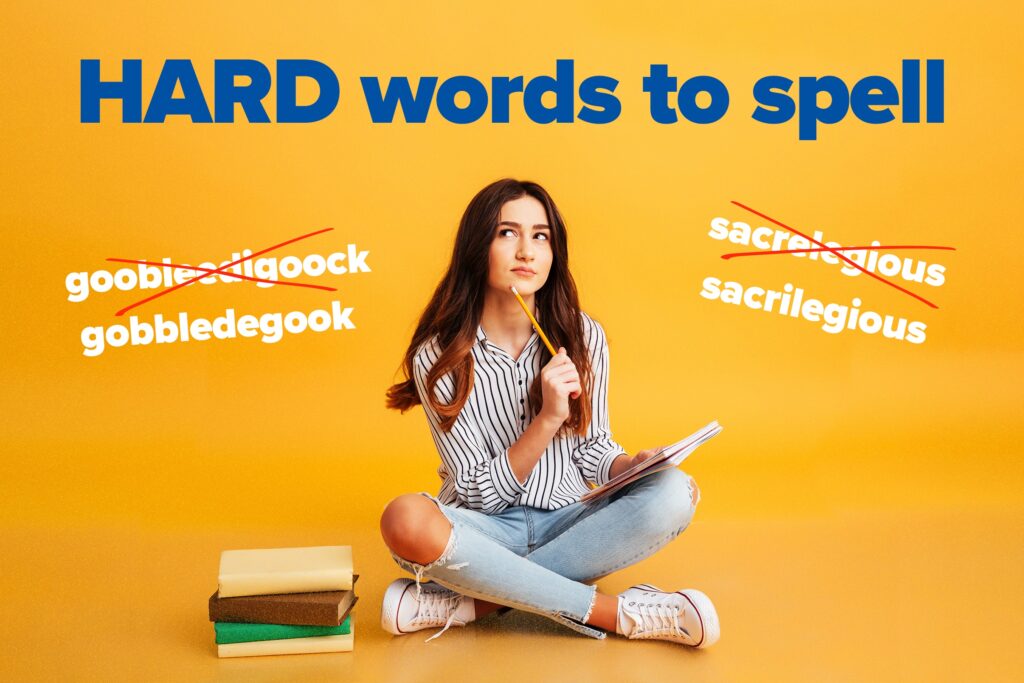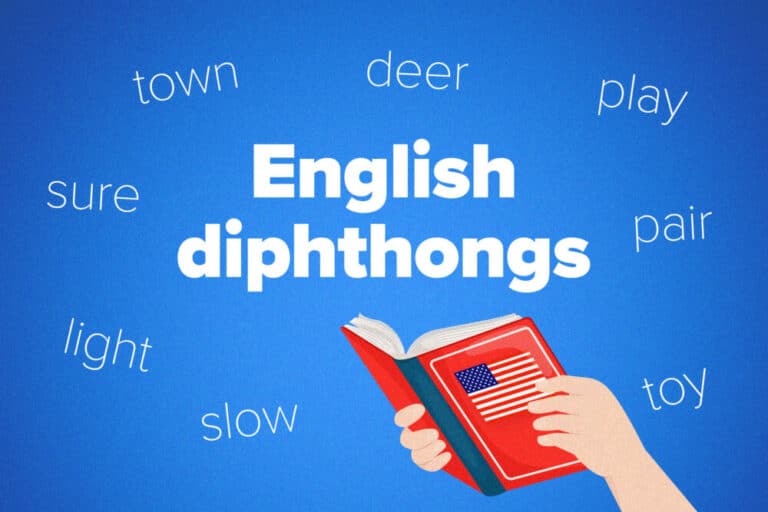50 Hard Words to Spell in English

Have you ever encountered a word in English that you could not spell right, no matter how hard you tried?
You’re not alone! English has a very old fashioned spelling system that sometimes isn’t at all related to how the word sounds today.
The good news is that everyone makes English spelling mistakes, even native speakers.
To avoid making spelling errors, we’ve put together this post of 50 hard words to spell along with the explanations of why they’re hard to spell.
Download: This blog post is available as a convenient and portable PDF that you can take anywhere. Click here to get a copy. (Download)
Top 30 Hard Words to Spell in English
| Words | Meaning | Why Its Tricky | |
|---|---|---|---|
| 1. | Gobbledegook | Language that is meaningless or hard to understand. | The repetition of similar-sounding syllables makes it a tongue-twister. |
| 2. | Fuchsia | A vivid purplish-red color or a flowering shrub. | Pronounced as "fyu-sha," the unconventional spelling can catch people off guard. |
| 3. | Acquiesce | To accept or comply without protest. | The combination of the 'c,' 'q,' and 'u' can be confusing. |
| 4. | Liaison | A close bond or connection. | The placement of vowels and consonants can be perplexing. |
| 5. | Minuscule | Extremely small or tiny. | Often misspelled as "miniscule," which is a common misconception. |
| 6. | Nauseous | Feeling queasy or inclined to vomit. | Confusion with its counterpart "nauseated" adds to the challenge. |
| 7. | Pochemuchka | A person who asks too many questions. | Its Russian origin and unique spelling pose a challenge for English speakers. |
| 8. | Sacrilegious | Violating something sacred or holy. | The combination of letters can be difficult to remember. |
| 9. | Weird | Strange or unconventional. | Its irregular spelling doesn’t follow typical phonetic patterns. |
| 10. | Accommodate | To provide lodging or make adjustments for someone. | The double 'c' and double 'm' can trip up even experienced spellers. |
| 11. | Chiaroscurist | An artist who specializes in chiaroscuro (light and shade in art). | Uncommon usage and a mix of consonants make it challenging. |
| 12. | Conscientious | Diligent and thorough in one's work. | Multiple syllables and the silent 'c' can lead to misspellings. |
| 13. | Indict | To formally accuse or charge with a serious crime. | Pronounced "in-dyt," the 'c' is silent and easily overlooked. |
| 14. | Logorrhea | Excessive and often incoherent talkativeness. | Uncommon usage and a tricky combination of letters. |
| 15. | Pharaoh | A title of an ancient Egyptian ruler. | The combination of 'a' and 'o' and silent 'h' can be confusing. |
| 16. | Bologna | A type of Italian sausage. | Pronounced "baloney," deviating from its spelling. |
| 17. | Bourgeois | Relating to the middle class; conventional. | Pronunciation can differ from the spelling, catching many off guard. |
| 18. | Dilate | To expand or make larger. | Often confused with "dialate," which is a common misspelling. |
| 19. | Garrulous | Excessively talkative, especially on trivial matters. | Uncommon usage and a combination of double 'r' and 'u.' |
| 20. | Handkerchief | A square piece of fabric used for personal hygiene or as a fashion accessory. | The combination of 'd' and 'k' is often confusing. |
| 21. | Ingenious | Clever, inventive, or resourceful. | The 'u' in the middle can be easily overlooked. |
| 22. | Mischievous | Playfully naughty or causing trouble. | Often mispronounced and misspelled as "misch-i-vee-us." |
| 23. | Onomatopoeia | A word that imitates the sound it represents. | The sheer length and Greek origin make it challenging for many. |
| 24. | Playwright | A person who writes plays. | The unusual combination of "play" and "wright" can be confusing for spellers. |
| 25. | Privilege | An advantage or an opportunity | The sequence of vowels and the silent 'e' can be confusing. |
| 26. | Psychology | The scientific study of the mind and behavior | The combination of silent letters and the order of consonants can pose challenges. |
| 27. | Rhythm | A strong, regular, repeated pattern of movement or sound | The silent 'h' and the unique arrangement of letters can be perplexing. |
| 28. | Separate | To set or keep apart; not joined or connected | Commonly misspelled as "seperate" due to the pronunciation. |
| 29. | Sincerely | In a genuine and heartfelt manner | The sequence of vowels and the silent 'c' can trip up spellers. |
| 30. | Definitely | Without a doubt; certainly | Often misspelled as "definately" due to the pronunciation and the tricky arrangement of letters. |
In this video, you’ll find a list of some words that are commonly misspelled in English.
Why Are Some Words Hard to Spell
Words with Confusing Letter Combinations
The English language has many combinations of letters that you see often. For example, CH, EI, IE and others can be particularly confusing for English learners.
This is because these combinations may be pronounced differently in different words or not pronounced at all!
| Words | Meaning | Examples |
|---|---|---|
| Achieve | to accomplish, get something done | I want to achieve my dream by age 40. |
| Receive | to be given something | I will receive $20,000 tomorrow. |
| Perceive | to become aware of something | Do you perceive a spirit in this room? |
| Deceive | to lie to someone | Please don't deceive your mother. |
Common misspellings of “achieve” include acheive, acheve, archieve and even achiev. To spell it right, just remember:
- There is no R in “achieve”
- The H is followed by I, just like in the English alphabet!
Why does “achieve” above use the IE vowel order, but “receive” uses EI, even though the syllable sounds exactly the same? Ask Shakespeare.
To remember these words, there’s a great mnemonic rule in English that you may have heard:
I before E, except after C, or when sounding like “A” as in “neighbor” or “weigh.”
The words above are great examples that are commonly spelled wrong because people remember “I before E,” but not the “after C” part or any of the rest.
Recieve, percieve and decieve are all wrong! E comes before I in these examples, because the EI combination comes after C.
This spelling rule, however popular, has plenty of exceptions.
You can also check out commonly misspelled English words here:
Words with Long Strings of Vowels
Words in this group are difficult because the vowels in them form sounds that are normally represented by just one or two letters. As a result, some vowels get lost in the process.
The best way to remember the spelling of these tricky nouns and adjectives is to make associations with other words that you do know how to spell.
| Words | Meaning | Examples |
|---|---|---|
| Acquaintance | someone you know | He's not really a great friend—he's more of an acquaintance. |
| Beautiful | pleasing to the eye or the mind | The rose bush looks beautiful this time of year. |
| Conscientious | putting a lot of effort into your work | To earn your medical degree, you need to be conscientious. |
| Queue | a line | The queue is going out of the door at the supermarket today. |
| Quay | a pier, a wharf | Walk down the quay and turn right when you see the big boat. |
“Acquaintance” is a tough one! The combination of UAI is not very common in the English language, but it occurs sometimes.
To master the spelling of this word, keep in mind that Q is always followed by U. Then memorize the A and I.
If you have ever studied French, you are familiar with the EAU vowel string. It is quite common in French! In fact, the French word “beau” means “beautiful,” which may help you to remember how to spell this important English adjective.
“Beautiful” is also difficult due to the TI part. People sometimes incorrectly spell the word as “beautyful” because of the obvious connection to the English noun “beauty.”
A rule of thumb to spell “beautiful” correctly is to alternate the Is and Us (U-T-I-F-U) and forget the Y in the noun.
“Conscientious” is a very useful adjective has a lot of Is and Os with Us and Es added. It can be difficult to spell it right.
Remember the mnemonic, “I before E, except after C”? It does not work here—this word is another exception to the rule.
If you are good at spelling the word “science,” which is yet another exception to the rule, you can use this to your advantage as well.
“Queue” word is all vowels. Wouldn’t it be better if it was just spelled Q? Or Kew? Remember that a Q likes a U. After that, add an E and repeat the vowel combination.
The term is more common in British English. In American English, the word “line” is used more often.
A friend of mine once confessed that he used to spell the word “quay” as “key,” until the day he saw it in writing. Just like with the word “queue” above, remember the QU combination. The rest you just have to memorize: UAY is just another tongue twister.
Words with Double Consonants
With words in these group, the difficult thing to spell are the double consonants.
| Words | Meaning | Examples |
|---|---|---|
| Accessible | easily reached | The new building is accessible for people in wheelchairs. |
| Address | the location of a place | Do you have my address in your phone? |
| Accommodation | lodging | Have you found accommodation for Friday in Austin? |
| Committee | a group of people formed to get something done | They formed a committee to deal with making the office smoke-free. |
| Occasional | occurring only sometimes | I only have a drink on occasional evenings. |
While there are a lot of examples and exceptions to the rules, pronouncing the words correctly will help you spell the words correctly too.
The sounds produced by double consonants are elongated. With one exception, all words below have more than one double consonant. So, remember to double up!
Words that Change Meaning Depending on Spelling
These words sound absolutely the same, but are spelled differently depending on their meaning.
| Words | Meaning | Examples |
|---|---|---|
| Lose / Loose | Lose means to not win. Loose means something about to detach or not fitting tightly. | Don't lose your key. I like to wear loose pants. |
| Weather / Whether | Weather is the natural phenomenon of rain, sunshine, snow and other daily changes in the atmosphere. Whether is a conjunction meaning "if." | I like rainy weather. Whether or not we decide to go to the game on Friday depends on the weather. |
| Than / Then | Than is a conjunction and a preposition used to compare and/or contrast two or more things. Then is an adverb meaning "after that." | I like dogs more than cats. I'll go to the market then to the flower shop. |
| There / Their / They're | There is an adverb indicating location. Their is the possessive form of "they." They're is a contraction of "they are." | There is no reason to get angry about this. Their dog is so cute. They're going to the opera tonight, right? |
Misspelling these words is very common among native English speakers, who automatically spell the words one way, while wanting to say something else (sometimes even without realizing it).
The rule to spell these kinds of words right is memorizing the correct spelling for all of them, then choosing the one you want to use! The difficulty is only in knowing which one is which.
One great way to hear (and see through interactive subtitles) these hard to spell words is with FluentU.
FluentU takes authentic videos—like music videos, movie trailers, news and inspiring talks—and turns them into personalized language learning lessons.
You can try FluentU for free for 2 weeks. Check out the website or download the iOS app or Android app.
P.S. Click here to take advantage of our current sale! (Expires at the end of this month.)

These are just some of the examples of many, many English words that are difficult to spell.
Don’t worry if you spell something wrong. Making spelling mistakes is something that happens to everyone all over the world, even to people who speak English as natives! Take the time to study the correct English spellings of words you use most often, and don’t be afraid to consult a dictionary when in doubt.
Download: This blog post is available as a convenient and portable PDF that you can take anywhere. Click here to get a copy. (Download)
And One More Thing...
If you like learning English through movies and online media, you should also check out FluentU. FluentU lets you learn English from popular talk shows, catchy music videos and funny commercials, as you can see here:
The FluentU app and website makes it really easy to watch English videos. There are captions that are interactive. That means you can tap on any word to see an image, definition, and useful examples.
For example, when you tap on the word "searching," you see this:
Learn all the vocabulary in any video with quizzes. Swipe left or right to see more examples for the word you’re learning.

FluentU helps you learn fast with useful questions and multiple examples. Learn more.
The best part? FluentU remembers the vocabulary that you’re learning. It gives you extra practice with difficult words—and reminds you when it’s time to review what you’ve learned. You have a truly personalized experience.
Start using the FluentU website on your computer or tablet or, better yet, download the FluentU app from the iTunes or Google Play store. Click here to take advantage of our current sale! (Expires at the end of this month.)










